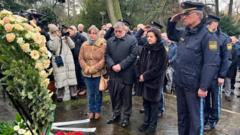The recent knife attack in Aschaffenburg has prompted Friedrich Merz, the opposition leader tipped to become Germany's next chancellor, to advocate for strict border controls and a radical overhaul of immigration policies. Both Merz and Chancellor Olaf Scholz's responses signal a potential shift in Germany's political climate as elections approach, particularly in light of rising far-right sentiments.
German Political Landscape Shifts Amid Calls for Stricter Immigration Policies

German Political Landscape Shifts Amid Calls for Stricter Immigration Policies
Following a tragic knife attack in Bavaria, German political leaders push for significant changes to border and asylum regulations, igniting debate ahead of elections.
A wreath was laid at the park in Aschaffenburg a day after the deadly attack. In the aftermath of a horrific knife attack that claimed the lives of a two-year-old boy of Moroccan descent and a 41-year-old man, the conservative opposition leader tipped to lead Germany, Friedrich Merz, is pledging profound changes to the nation's border and asylum policies. The incident, which also left several others injured, occurred in Bavaria and intensified the political dialogue surrounding immigration.
Merz has boldly stated his intention to effectively close Germany's borders to irregular migrants, even those eligible for asylum, asserting that Germany has reached the limits of its current immigration policies. The Afghan man, accused of the attack, had entered Germany in 2022 and was already known for previous violent behavior. As public outrage builds, both Chancellor Olaf Scholz and Merz have adopted a firmer stance, with Scholz labeling the incident an "act of terror," despite ongoing investigations revealing no clear terrorist motive.
The recent violence has raised alarms over the safety of children and sparked a strong response from Merz, who declared his determination to bring about change on his first day in office if elected in the forthcoming February elections. He criticized the past decade of asylum policies under Angela Merkel's administration, where Germany welcomed over a million refugees during the 2015 migrant crisis, as misguided.
As the conservative Christian Democrats lead opinion polls ahead of elections, Merz remarked, "We see before us the ruins of 10 years of misguided asylum and immigration policy in Germany." He emphasized the need for Germany to reclaim control over its legal framework regarding immigration and stated a plan to increase detention centers in preparation for deportations.
His proposals have drawn parallels to the hardline immigration policies espoused by U.S. politics, following the recent return of former President Trump to the White House. With the far-right Alternative for Germany (AfD) party gaining traction by focusing on immigration, AfD leader Alice Weidel has publicly demanded immediate action in response to the Aschaffenburg incident.
Critics of the political shift argue that moves to become tougher on immigration are long overdue and may only serve to empower the far-right AfD. Meanwhile, coalition-building in German politics adds another layer of complexity, as leaders like Christian Lindner from the Free Democratic Party indicate that sweeping reforms may not be feasible if mainstream parties form alliances.
Interior Minister Nancy Faeser cautioned against exploiting the tragedy for political gain, emphasizing the need for a humane approach amidst populist rhetoric. The shock from the attack continues to resonate, especially considering the heroism of the man who saved other children during the incident. As political leaders chart their paths in the weeks leading to the elections, immigration remains a critical and highly polarizing issue.




















